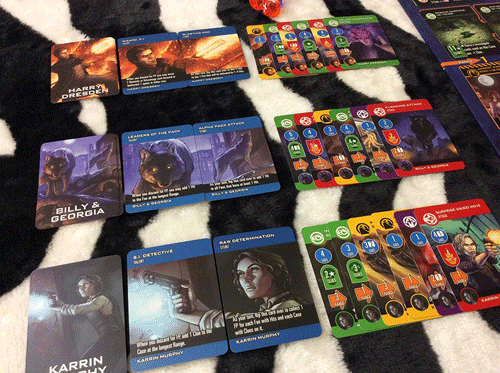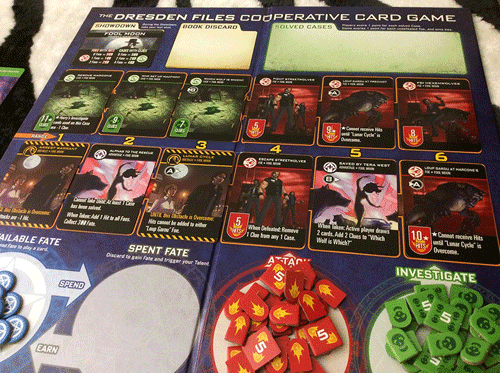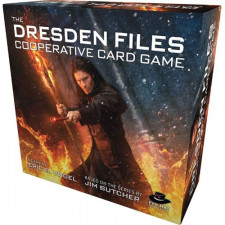Dresden Files Cooperative Card Game Review
on Mar 15, 2017
The Dresden Files Cooperative Card Game is a slug of nostalgia right to the sternum. It transports me--“Aperturum!â€--back in time to when I started reading the Dresden Files novels, carrying a rising tide of emotions and memories. No, that’s not a good thing.

The Dresden cast is all here, though you'll need the expansions for favorites like Thomas and Molly.
I can't be the only one who found the early Dresden Files books frequently insufferable. Chicago’s only practicing wizard is a misogynistic, whiny dweeb, and the prose has all the finesse of a dump truck. Only Butcher’s mastery of broader plot hooks kept me reading until he and his characters matured a little. The Dresden Files card game perfectly replicates the frustrated potential of those early Dresden books. Mostly, it's sterile and calculating, until it gets melodramatic and maudlin. It's like a bad sex scene—and Dresden's seen a few. Hell's bells, it's just bad storytelling.
So what's the scoop? Each book is represented by a special 13-card deck, 12 of which are shuffled and lined up in parallel rows. These are the Foes, Obstacles and Cases Harry & Co. need to tackle, plus a few Advantages they can grab along the way. What makes them unique? For the most part, nothing. Your average Foe is just a red-bordered picture and a number representing the hits you need to place to defeat it. Cases are identical, except they’re green (like emeralds, not well-worn dollar bills) and require clues, not hits. How are clues and hits different? Obviously, clues are green.... Oh, you mean other than that? 'Fraid I can't help you there, Kemosabe. Yellow-bordered Obstacles create negative effects that persist until they’re overcome, and purple-bordered Advantages provide a unique, you guessed it, advantage when removed from play. To win, players need to solve more Cases than there are Foes left standing, with each book featuring a different balance of card types.

While most cards don't have unique art, the illustrations that are present are top of the line.
To match, hero cards also come in four types: green Investigate, red Attack, yellow Overcome, and purple Take Advantage cards. It isn't rocket surgery to figure out what these do. Again, these are mostly just pictures and numbers, with only a few cards per deck having any special ability text. Each player card only works against targets at a given Range, measured from left to right in each row. Maybe this represents how Harry can't go solving murders when there's a massive chlorofiend trying to murder him. When cards are removed from play, everything else shifts left, making previously untouchable foes and unsolveable cases accessible. Player cards also cost Fate to play, which can be regained only by discarding cards. Discarding for Fate also triggers your character’s Talent, a special bonus that makes you you. Murphy and Susan can put out clues, the Alphas distribute hits, Michael gets a minor blessing to increase his Range, and Harry can loud-mouth Obstacles or Advantages right where you need them. Each character also gets a once-per-game Stunt that can be used instead of your normal turn.
It's surprisingly abstract for a Dresden game put out by an RPG company, a logical puzzle of the kind Waldo Butters would probably find fascinating. Abstract is fine; I don’t need to know how massive my barbarian’s thews are to have a good time. Since players don't typically draw cards during the game, it creates a satisfying dilemma as players discuss how best to employ their limited resources to accomplish the impossible.
Just when things are going smoothly, Harry's legendary bad luck rears its head. Listening to his inner demon, someone decided what this tight, logical puzzle really needed was a buttload of dice. Several actions have a variable cost or effect, determined by rolling one or more Fate Dice, which have an equal chance of coming up neutral, +1 or -1. Predictably, this gets along with the rest of the game like a house on fire. It's the Showdown that really spoils things, though. If players can’t win before they run out of cards or FP, the game goes into Showdown, when everybody gets one last chance to place clues and hits on partially completed cards. How do they do this? By rolling double fistfuls of Fate Dice! Even playing well, you're supposed to end up risking it all in the Showdown. The dice gods being fickle, you'll often die, like Harry, doing exactly the right thing.
More often than not, in the books, Harry's luck allowed him to survive the day, but I seem to recall he put more faith in his Dirty Harry than in some Hail Mary. Butcher's big action scenes were always his greatest asset, but contrasted with the calculating nature of this game, they're a liability.

 Customer Support
Customer Support  Subscribe
Subscribe 




 Account
Account  Wishlist
Wishlist 

